Date Visited: September 2018
Introduction
Tourism in Solomon Islands is in its infancy. According to the Solomon Islands Visitors Bureau, the number of ‘tourists’ to the country is approximately 6,000 per year. Rugged and undeveloped, the Solomon Islands are not an easy or cheap travel destination but it does offer an abundance of rewarding travel experiences for intrepid travelers.

The Solomon Islanders are some of the friendliest people you will ever meet.
Apart from pristine nature, dazzling reefs, gin-coloured seas and a fascinating history, the real charm of the Solomon Islands are the incredibly friendly and engaging locals. The country promotes itself as The Hapi Isles and it’s no idle boast, the people are friendly, welcoming, polite and always offer the warmest of smiles. The children of SI are adorable and love posing for the camera.

So many sweet memories from the Solomon Islands.
Unfortunately, all visitors enter the Solomon Islands through the capital, Honiara, which is not the best introduction to the country. A charmless, dusty, noisy place, the best thing you can do in Honiara is take the first flight (not cheap!) to the beautiful provinces.

A volcano near Munda provides a dramatic backdrop to Roviana Lagoon.
It’s in the provinces that the real treasures of the Solomon Islands are revealed. The myriad islands in this archipelago nation remain undeveloped and untouched by tourism – emerald-coloured gems, scattered throughout turquoise-blue seas, all waiting to be explored by adventurous souls.
Location
Located in the South Pacific, the Solomon Islands lie directly east of Papua New Guinea, 975 km north-west of Vanuatu – 1,381 km north of New Caledonia and 2,117 km north-east of Brisbane.
This archipelago nation consists of a double chain of volcanic islands and coral atolls. The country comprises most of the Solomons chain, with the exception of Buka and Bougainville, two islands at the north-western end that form an autonomous region of Papua New Guinea.

A map of the Solomon Islands painted on traditional Tapa cloth.
People

The real joy of travelling in the Solomon Islands is time spent with the friendly locals.
The 626,000 inhabitants of the Solomon Islands are predominantly Melanesian (94.5%), with a tiny Polynesian (3%), and Micronesian (1.2%) population.
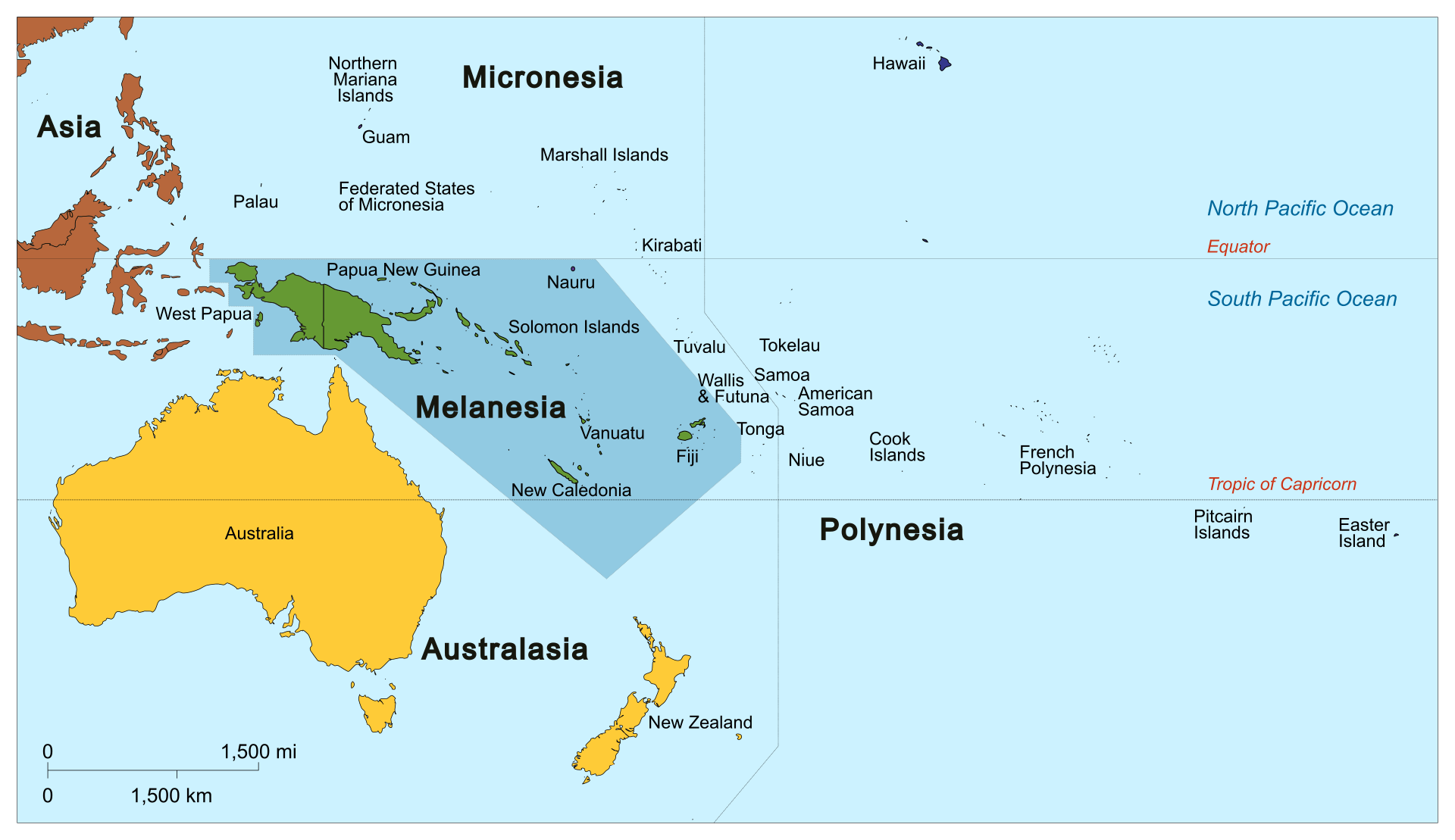
A Map of Melanesia.
Historians believe that, along with Australian Aborigines, the Melanesians emigrated from Africa into southern Asia between 50,000 and 100,000 years ago. Using land bridges, which existed due to low sea levels, they eventually migrated east to Australia and Papua New Guinea (PNG), arriving there 40,000 years ago.

Children in the Solomon Islands love posing for the camera.
A further migration from PNG saw the first settlers arrive in the Solomon Islands approximately 30,000 years ago. DNA tests have shown that the Melanesians are distinctly different to Polynesians and Micronesians who it’s believed arrived in the Pacific from what is today Taiwan.
Flag

Solomon Islands Flag
The flag of the Solomon Islands consists of a blue upper triangle which represents the ocean, while a lower green triangle represents the land and the diagonal yellow stripe represents sunshine. The five white stars represent the five main island groups.

Souvenir flags of the Solomon Islands on sale in Honiara.
Currency

The colourful Solomon Islands dollar.
The currency of the Solomon Islands is the Solomon Islands dollar (SI$). Bank notes are issued in denominations of SI$5, 10, 20, 50 and 100,

The Solomon Islands $5 bank note.
Current exchange rates (October 2018):
- US$1 = SI$7.86
- AUD$1 = SI$5.59
To commemorate 40 years of independence in 2018, the Central Bank of the Solomon Islands commissioned a special, limited edition (100,000 notes) SI$40 polymer note which was designed and printed by De La Rue of the UK. The bank advised me that they plan to eventually convert all notes to polymer.

A limited edition $40 polymer bank note was released to commemorate 40 years of independence in 2018.
Philately

The stamps of the Solomon Islands often feature local marine life.
The stamps of the Solomon Islands can be purchased from the Philatelic counter, inside the main post office in Honiara. The website of Solomon Islands Post contains a link to their Lithuanian-based stamp printer’s online shop, from which you can purchase SI stamps online.
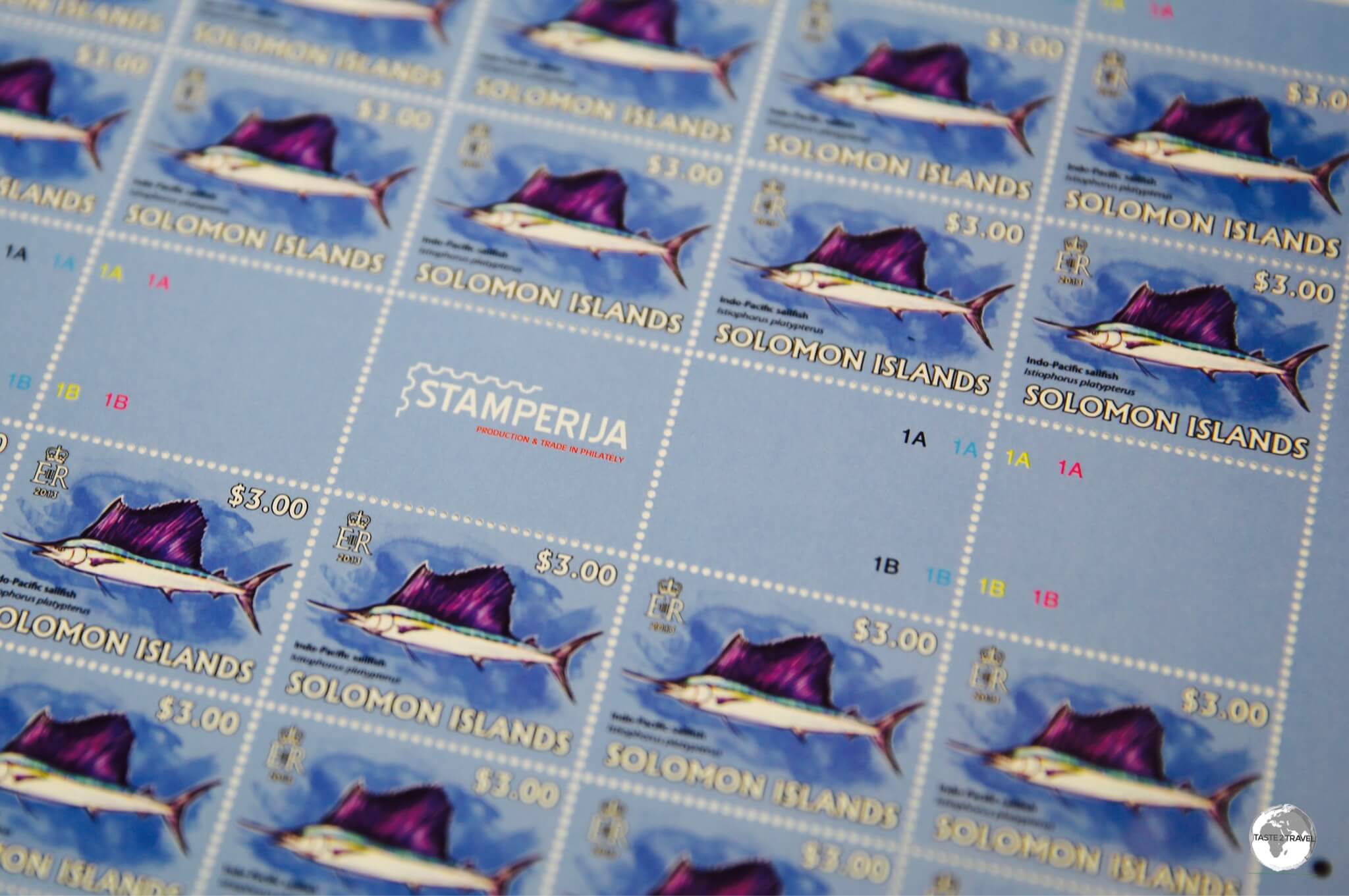
Solomon Islands stamps are produced in Lithuania by Stamperija and can be purchased from their online store.
Internet Speeds
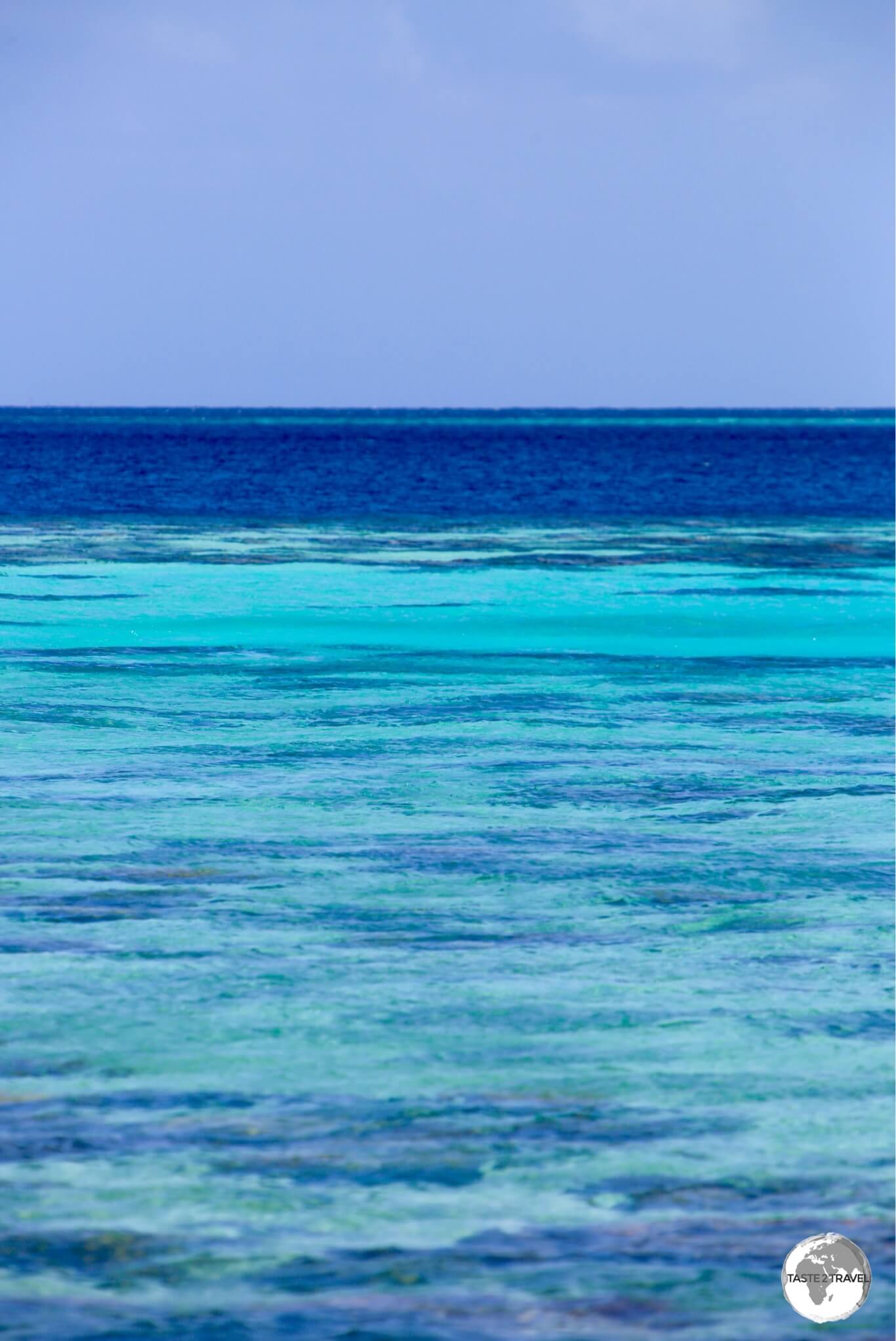
Solomon Islands Blues – blue because there is no undersea internet cable.
Internet speeds in the Solomon Islands are some of the slowest in the Pacific region, all due to the fact that the country is yet to be connected to the outside world via an undersea internet cable.
The Chinese company Huawei offered to fund a cable, connecting Honiara to Sydney but the Australian government, sighting national security concerns, didn’t like the idea of a Chinese company connecting anything to Australia.
In June of 2018, the Australian government announced that it would fund and build the cable. So far work has yet to commence and in the meantime you can expect internet speeds of around a cracking 300 kbps.
Sightseeing

Artwork at the Solomon Islands Art Gallery in Honiara.
Guadalcanal
Honiara

Craft shop at the Solomon Islands Museum in Honiara.
With a population of 56,298, Honiara is the largest city in the country with a few sights of interest. The city is located on the waterfront but has its back firmly turned against it. Instead, the focus of the town lies one block inland where drab, cheap, Chinese shops line the dusty, pot-holed, congested main road – Mendana avenue.
Around Town

The Solomon Islands National Museum in Honiara.
Located downtown on Mendana avenue, the Solomon Islands National Museum complex consists of three buildings and a gift shop.

The RAMSI Mission exhibition at the National Museum.
The newest exhibition details the RAMSI mission from the recent political troubles. The other two older buildings provide an overview of the history and culture of the Solomon Islands and, if you’re heading out into the provinces, provides good background information on what you can expect to see and experience.

Local artist ‘Pollo’ explaining his works at the Art Gallery in Honiara.
Across the road from the museum, the Solomon Islands Art Gallery showcases art from local artists with most pieces available for purchase. At the time of my visit, work was being completed on the grounds with a series of new shops about to open which would house the numerous crafts stands which line the dusty footpath outside.

One of the many craft shops outside the Art Gallery of Honiara.
At the other end of Mendana avenue, the Honiara Central Market features produce from around the island. If you wish to sample some cheap, local fare, there are food stalls at the back where you can mix-it-up with the locals.

The relaxing Memorial Garden is adjacent to the airport terminal.
Next to the airport terminal is the small Honiara Memorial Garden, which honours US forces and their Pacific islander allies.
WWII History

The Guadalcanal American Memorial in Honiara.
Located on a remote hilltop on the outskirts of town, overlooking the suburbs of Honiara, is the impressive (and free) Guadalcanal American Memorial. This informative and interesting memorial is maintained by the American Battle Monuments Commission, which maintains US memorials and cemeteries in 15 different countries.
Dedicated to American and Allied troops who lost their lives during the Guadalcanal campaign, the memorial is built on Hill ’72’ which was a former WWII battle site. Details of the six key battles which took place between the US and Japanese during the campaign are etched into giant granite panels.

The open-air displays at the Vilu War Museum are slowly succumbing to the elements.
Guadalcanal was a major WWII battle sight between the Americans and the Japanese. Tours of battle sites and relics can be organised through Travel Solomons whose office is located downtown close to the museum.
One of the sights they include on their trips is the Vilu War Museum, which at SI$100 is not cheap. I made my own way to the museum in my Toyota RAV4, but of course got a little lost since there is no signage anywhere and the museum is located in the middle of the bush at the end of an overgrown dirt track, 24 km west of Honiara. Some helpful locals put me back on course!

Displays at the Vilu War Museum.
The museum features a collection of WWII relics (both US and Japanese) from planes to tanks to anti-aircraft guns which are arranged in an outdoor garden setting. The collection was accumulated by the late father of the current proprietor but the tropical weather is slowly taking its toll on the machinery, all of which is exposed to the elements.
Scuba Diving
With all the fighting that took place on Guadalcanal during WWII, the waters around the island are home to some impressive wrecks. Tulagi Dive organises dives from their dive shop, which is located next to the Point Cruz Yacht Club in downtown Honiara.

Carved masks, such as this one in Honiara, are popular souvenirs.
Western Province

Colourful woven bags make ideal souvenirs.
Munda

Young boy in Munda.
Scuba Diving
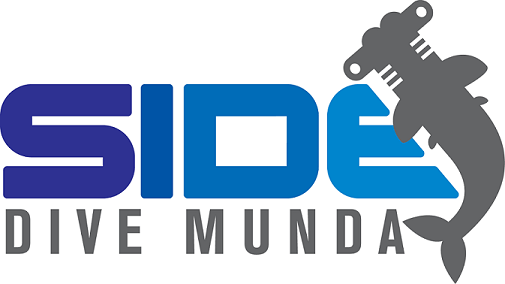
Dive Munda – possibly my favourite dive operation in the whole world!
There’s just one reason people flock to Magical Munda – the sublime Scuba Diving. It’s still a well-kept secret that the Solomons Islands offers some of the best scuba diving in the South Pacific and Munda is the place to experience the incredible underwater wonders of this off-the-beaten-track dive destination.

The team at Dive Munda (l-r) Jeno, myself, Euna, Belinda and Sunga.
Munda was a major battleground during WWII and the turquoise-coloured waters of the stunning Roviana Lagoon are littered with interesting wrecks from ships to downed fighter planes. The reefs around Munda are in pristine condition with an incredible amount of lush hard and soft corals and massive Elephant Ear sponges. Marine life is abundant with sight names such as ‘Shark Point‘ offering a hint of what lies below.

The two amazing local divemaster’s from Dive Munda, (l-r) Euna and Jeno.
Dive Munda is the only dive shop in town and is conveniently located inside the only hotel in Munda, the Agnes Gateway Hotel. Dive Munda is owned and operated by the enthusiastic, energetic, charming and engaging Belinda Botha who is a South African native who now calls Munda home.

The Dive Munda team (l-r), Sunga, Jeno and Euna made a beautiful flowery lei during our surface interval.
Belinda is a tour-de-force who has become Munda’s #1 fan and promoter and it’s leading environmental champion. She has employed an incredibly capable team of locals who are the dive masters, boat captain and (during surface intervals on remote islands) flowery-lei makers. They are a truly talented bunch and I loved spending time with them. Some of the best dive memories ever!

On our way to dive ‘Shark Point’.
Dive Munda offers in excess of 30 dive sites in and around Munda, with one of my favourites being ‘Alice in Wonderland’ which starts with a decent to 14 metres to view an upturned F4F-4 Wildcat – a US fighter jet which was shot down by Japanese fire. This wreck was only recently discovered and is in pristine condition.

Sea gulls flying over Roviana Lagoon at Munda.
The beautiful aspect of diving in Munda is that Dive Munda has all these amazing sights to itself. There are never any other groups on a dive site, never any other boats around. The sites are all yours to explore in peace. Magic!

Surface intervals with Dive Munda are always on uninhabited islands which feature wild orchids among other flora.
WWII History

Barney explaining Munda’s WWII history at his museum.
In between dives, there’s plenty to occupy your time on land. Munda has a wealth of fascinating WWII history which can easily be explored on foot. The best place to gain an understanding of Munda’s involvement in WWII is at the Peter Joseph WWII Museum which has been created by the knowledgeable Barney, who is the closest thing to a WWII Historian in these parts.

Some of the many Dog Tags found by Barney over the years.
The museum (SI$50) is housed in a shed in Barney’s front garden and is comprised of Barney’s vast, personal collection of WWII relics and memorabilia which he has accumulated over the years.

An article from an American newspaper tells of the return of missing Dog Tags from Barney’s collection to the original owner.
Barney has found many lost Dog Tags over the years, some of which have been reunited with their very grateful owners. There’s no signage for the museum but it’s located behind the only playing field in town.

Japanese anti-aircraft guns make for the coolest garden furniture at this Munda home.
Scattered around Munda are countless WWII relics and dumps. The front garden of one house features two Japanese anti-aircraft guns which remain where the Japanese left them when they fled from the Americans. And you thought your garden furniture was cool!
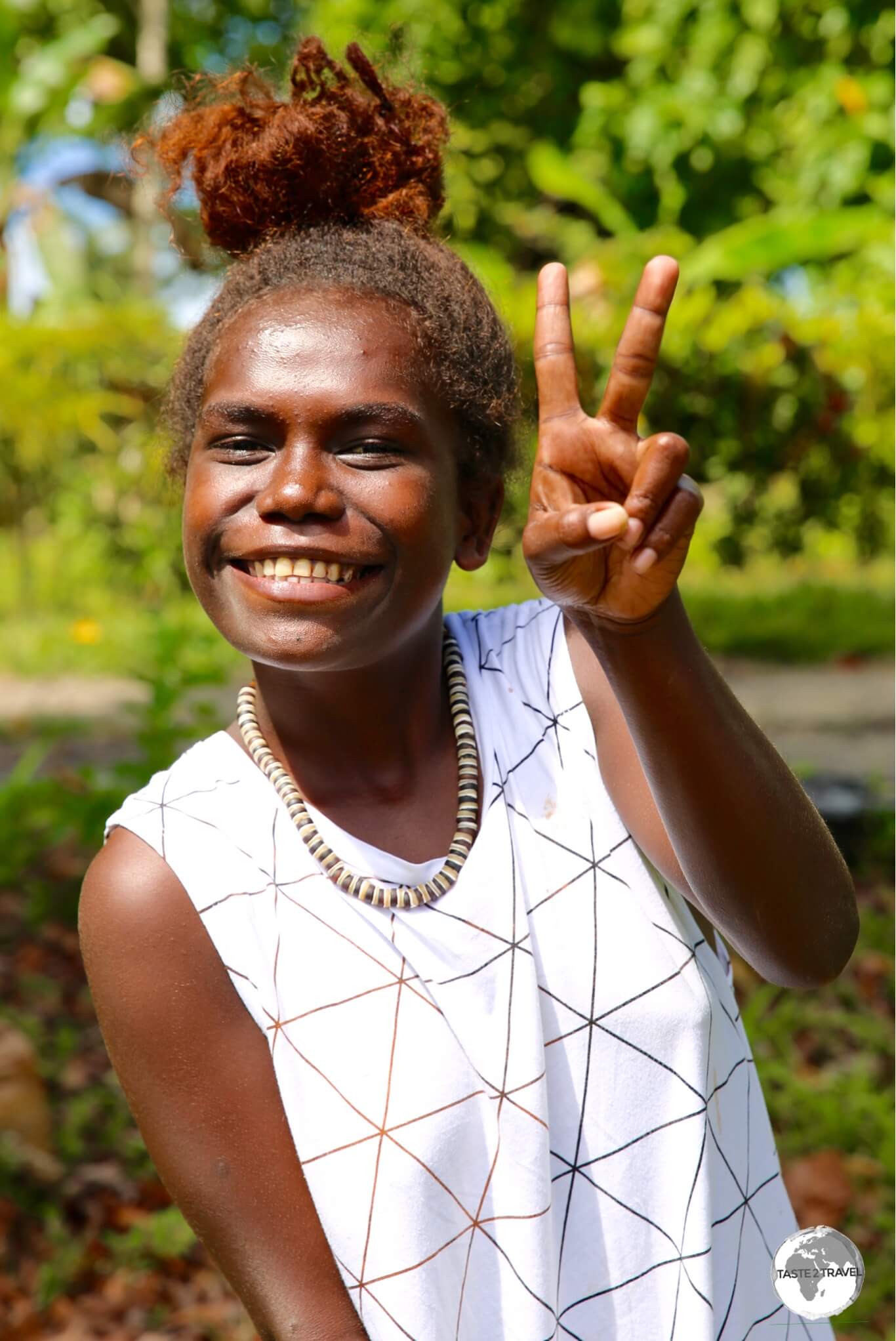
No shortage of smiles in Munda.
At the rear of the same house, just beyond the clothes line, is an overgrown WWII dump where US landing boats have been piled up.

Dumped US landing boats piled up in someone’s backyard.
Elsewhere anti-aircraft guns, tanks and other equipment can be found lying where it was left when troops departed after the war.

A WWII relic lies where it was left behind a house in Munda.
One of the more interesting sites is an old concrete bunker which was constructed by the US as an ammunition store. Today it houses a collection of WWII relics which have been collected by the traditional landowners.

A former US ammunition store in Munda houses one family’s collection of WWII relics.
Gizo

A seller at Gizo market.
Located a short boat ride from Munda is the regional centre of Gizo, the second largest town in the Solomon Islands, which can be covered on foot in under 10 minutes. The attractions of Gizo are limited to the Central market but the real attractions are offshore on the myriad islands which are a short boat ride away.

Produce at Gizo market.
Babanga Island

A view of paradise from Fatboys Resort.
Located 15 minutes by boat from Gizo, Babanga Island is surrounded by the most amazing gin-coloured waters. It’s here you’ll find the wonderful island getaway that is Fatboys Resort.

The view from the restaurant at Fatboys Resort with Kennedy Island in the background.
Fatboys offer five waterfront bungalows and an over-water bar/ restaurant. I visited as a day tripper from Gizo, which is not a problem provided you eat lunch in their restaurant, which is highly recommended as the fresh fish is divine. The snorkeling is incredible with a huge amount of marine life, including the occasional cruising black-tip reef shark. Fantastic!
Kennedy Island

The beach at Kennedy Island.
Kennedy Island is a small island located 15 minutes by boat from Gizo, directly opposite Fatboys Resort.
The island is named after then Lieutenant John F. Kennedy, who in August 1943 swam to the island with his crew of the PT-109 after their boat was rammed and wrecked by the Japanese destroyer, Amagiri. Two American sailors died in the incident. Kennedy later had the crew swim to the larger Olasana Island where they were eventually rescued.

The bar on Kennedy Island only ever gets busy when a cruise ship is in town.
Today, Kennedy island is home to a bar which is owned by Hotel Gizo who charge a SI$50 landing fee, which includes a complimentary drink. At the time of my visit, I had the island to myself.

Despite the fact that he bit me, I’m sure Kennedy and I would have become great friends eventually!
The only inhabitants on the island are the friendly caretaker, his wife and a semi-tamed Yellow-Bibbled Lory, fittingly named ‘Kennedy’. Kennedy has the island to himself and can be found flying among the many trees – but packs quite a bite if you get too close.

‘Kennedy’ is a cheeky Yellow-Bibbled Lory.
Accommodation
Accommodation options are limited in the Solomon Islands with many towns offering just one or two guest houses. In Honiara, the capital and largest city, you’ll find just six hotels listed on booking.com, most of which are old and in need of renovation and score low with reviewers. The exception to this is the flashy, new kid on the block, the Coral Sea Resort.
In Gizo, the second largest town in the country, there is one hotel and one lodge and in popular Munda there is one main accommodation option. This lack of competition is never going to be good for travelers with properties able to charge higher rates due to a lack of choice and under no pressure to improve their offering.
Honiara
Coral Sea Resort

My beautiful room at the Coral Sea Resort, which offers the highest standard of accommodation in the Solomon Islands.
Without a doubt, the flashiest hotel in Honiara and the most deluxe hotel anywhere in the Solomon Islands is the very new and wonderful Coral Sea Resort. Managed by a team of Australians, the hotel is located downtown on the waterfront, and features a swimming pool, casino, two restaurants with bars which are always lively with both tourists and visiting businessmen.
The hotel offers five different room types with a new wing currently under construction. Current rates on booking.com range from US$160 to US$350 with all rooms including breakfast. I stayed here on my first night in town and thoroughly enjoyed it – but then I awoke in the morning and remembered my travel budget!
Solomon Kitano Mendana Hotel
The Solomon Kitano Mendana Hotel is part of the Japanese Kitano group which is great news for no other reason than the hotel is home to a fantastic Japanese restaurant (see the ‘Eating Out‘ section below for more details).
The hotel is a solid Japanese construction with spacious rooms, some of which have recently been renovated while others are very dated. Current rates on booking.com range from US$142 – US$363 per night.
Access Units

Apartments at ‘Access Units’ are very spacious and comfortable – a real home away from home.
Located close to the airport, Access Units on Ramsi street is a block of secure, self-contained, modern, spacious apartments which can be booked through Airbnb.com. Airport transfers are provided free of charge and a free ‘wash and fold’ laundry service is included in the rate as is a selection of free provisions in the kitchen.
Due to its remote location on the outskirts of town, it’s best suited to guests who have their own transport. If you wish to rent a car, the owners (John and Zima) have a reliable Toyota RAV4 which they rent to guests.
The nearest public transport are the mini buses (SI$5 to town) that shuttle along the main highway, a 1.5 km walk from the apartments. Buses run during daylight hours only so a taxi is required after hours, with the fare costing SI$100 from the city.
Munda
Agnes Gateway Hotel

My room at Agnes Gateway Hotel in Munda.
There’s just one main accommodation option in tiny Munda – Agnes Gateway Hotel. Located a short walk from the airport and overlooking the beautiful Roviana Lagoon, Agnes offers a variety of accommodation options to suit all budgets. There is no other competition in town and their rates reflect that fact, with a bunk bed in a dorm costing US$43 and a deluxe room costing US$121. I stayed in both a budget room (old and tired) and deluxe room (much nicer) and would recommend spending the extra money for the deluxe experience.
The food and service at Agnes are very good and I would recommend it as a fine place to stay while in Munda, especially since it’s really the only place to stay. Some new competition in town would be good!
If you’re diving with the amazing Belinda and team from Dive Munda, Agnes Lodge is the best place to stay as the dive shop is located at the lodge.
Gizo
Rekona Lodge

A ‘no-frills’ budget room at Rekona Lodge.
Rekona Lodge was my accommodation choice while in Gizo and I would recommend this over the Gizo hotel. Located in a quiet backstreet, this lodge has a variety of rooms to suit all budgets. Their basic, budget room with shared bathroom costs US$35 while the same room with private bathroom costs US$50. Their deluxe rooms are the best in town (better than anything I saw at Hotel Gizo) and cost US$96.

Worth paying more for a deluxe room at Rekona Lodge.
Gizo Hotel

The Gizo Hotel is the only hotel in Gizo and, at the time of my visit, had no running water in the bathrooms.
Located opposite Gizo wharf, the Gizo Hotel is the only place in town which calls itself a ‘hotel’. This is the sister property of the King Solomon Hotel in Honiara, offering 51 rooms on two levels (although at the time of my visit the upstairs rooms had no running water) with rates ranging from US$87 – $100.
The hotel has the best restaurant in town (there is only one other) and features lively traditional dance shows on certain evenings. The wood-fired pizzas in the evening are excellent!
Fatboys Resort

All bungalows at Fatboys Resort face the spectacular reef.
Fatboys Resort overlooks the gin-coloured waters of Babanga Island which offers incredible snorkeling. The resort is a 15-minute boat ride from Gizo and offers 5 bungalows, all of which offer uninterrupted views over the stunning lagoon.
Bungalows cost around US$244 for a one night stay with cheaper rates for longer stays. The bar and restaurant are situated 100 metres out over the sparkling waters and serves wonderful local seafood and ice-cold drinks. Day visitors are welcome and the resort can organise a boat to collect you from Gizo.
Eating Out
Dining out is not an option for struggling locals so there are few restaurants in the Solomon Islands with most being located inside the various hotels. As for cafés, there are just two in the country, both of which are located in downtown Honiara.
Honiara
Cafés
With many locals earning a weekly salary of between SI$200 and SI$400, it’s not surprising that few venture into a cafe to pay SI$30 for a cappuccino. The two cafés in Honiara are the domain of tourists, expats and the wealthy elite. Both open early in the morning and close early in the afternoon.
Located across the road from the museum and next door to the art gallery, the sparkling clean, air-conditioned Breakwater Cafe is the perfect retreat from the heat, humidity and dust of Honiara. The cafe opens its doors early, serving a very good breakfast (until 9:30 am) then a wonderful lunch menu, before closing its doors promptly at 3:00 pm. The coffee is wonderful as is the selection of cakes – including the giant-size, freshly made Lamingtons! Wi-Fi is not available.
Coral Sea Resort
The best dining options in Honiara are at the brand new Coral Sea Resort, which offers two superb restaurants. Haydn’s Steakhouse is the main restaurant, which starts the day serving a wonderful breakfast menu and perfect coffee prepared by trained baristas. For lunch and dinner, the menu includes a choice of Australian and European cuisine.
The other dining option is The Boardwalk which specialises in South-East Asian street food, with an emphasis on Malaysian mamak food. Located at the waterfront bar, this restaurant is more casual than Haydn’s.
This Japanese-owned hotel is home to the wonderful ‘Hakubai’, the best Japanese restaurant in the Solomons. If you’re in the mood for some fine sashimi, sushi or ramen, you’ll satisfy your cravings at this excellent establishment, which feels like it has been transported straight from Tokyo.
Opposite Hakubai is the restaurant ‘Capitana‘, which serves more traditional fare including fresh local fish, seafood and pizzas. They offer a buffet dinner every Wednesday evening.
King Solomon Hotel
Hidden away in a downtown backstreet, the sprawling King Solomon Hotel is renowned for its wood-fired pizzas which are prepared in an outdoor clay oven. Traditional Polynesian dancing is offered on certain evenings and the popular and lively bar is a good place to meet expats and enjoy a cold Sol Brew.
Munda
There is just one restaurant in Munda, which can be found inside the only hotel in town, the Agnes Gateway Hotel. Open from early morning to late evening, the waterfront restaurant offers wonderful breakfasts and generous portions of fresh, local fish for lunch and dinner. Apart from local seafood, their hamburger ‘with the works‘ is very popular.
Gizo
There are two restaurant options in town, with the restaurant at the Gizo Hotel being the more popular. Open from early morning, this is the only place in town serving breakfast. Being the sister property of the King Solomon Hotel in Honiara, the Gizo Hotel also serves excellent wood-fired pizza in the evenings.
The other dining option is PT-109 which is a 5 minute walk along the main street from the Gizo Hotel. This is a family run restaurant which serves local cuisine in a casual waterfront setting.
Visa Requirements

Solomon Islands Passport Stamps.
Nationals of all countries in the Schengen Area, Israel and the UAE may enter the Solomon Islands visa-free for up to 90 days within a 180-day period. Forty-four other nationalities are entitled to a stay of 3 months in a 12-month period. To check your requirement, you should consult the current Visa Policy of the Solomon Islands.
Getting There

Arriving at Honiara International Airport.
Air
All international flights arrive at Honiara International Airport, which is located 8 kilometres (5 miles) west of downtown. The airport is the hub for Solomon Airlines, whose fleet consists of five planes – one Airbus A320 (used for international services), and their domestic fleet of three Twin Otters and one Dash-8.

Solomon Airlines’ sole international jet, its Airbus A320.
The following airlines provide services to/ from Honiara:
- Air Niugini – flies to/ from Nadi, Port Moresby
- Fiji Airways – flies to/ from Nadi, Port Vila
- Nauru Airlines – flies to/ from Brisbane, Nauru
- Solomon Airlines – flies to/ from Afutara, Arona, Atoifi, Auki, Bellona, Brisbane, Fera, Gizo, Kagau, Kirakira, Marau, Nadi, Port Vila, Ramata, Seghe, Suavanao, Sydney, Tarawa
- Virgin Australia – flies to/ from Brisbane
Airport Transport
Although the airport is just 8 km from downtown, the one lane highway is often congested, with drivers serving to avoid the numerous deep potholes. The Japanese government is currently funding a project to upgrade the highway but in the meantime, it can take up to an hour to reach downtown if you get stuck in the morning rush hour.
Brisbane to Munda Direct
Solomon Airways have announced the commencement of direct flights from Brisbane to tiny Munda, starting on the 27th of October 2018.

Flying over the Roviana Lagoon on approach to Munda.
Sea
The Solomon islands are not a standard destination for Pacific cruise ships, however some ships call at Honiara and Gizo.
- Honiara – Fifteen cruise ship arrivals are scheduled for Honiara in 2019.
- Gizo – Three cruise ship arrivals are scheduled for Gizo in 2018.
Getting Around

Boarding my Solomon Airways flight from Honiara to Munda.
Air
Domestic flights are operated by Solomon Airlines, who offer services to 20 regional centres in various provinces. All flights have a baggage limit of 16 kg (35 lbs), although I never saw this being enforced.
Solomon Airlines operate in a monopoly environment and, like all good monopoly carriers, their ticket prices can only be described as extortionate. Airfares on the airlines’ website are quoted in Australian dollars (AUD$) with flights sold in one way segments. The cost of a one way ticket from Honiara to Munda (55 mins) is currently AUD$300 (USD$213).

Nusatupe airport in Gizo is built on its own island, requiring a boat transfer across a sometimes rough channel to Gizo.
The 4 planes which comprise the domestic fleet fly at 2000 m (6500 ft), providing spectacular views of the islands and lagoons. Despite the high prices, seats are limited and flights can be heavily booked so it’s best to book in advance.

Departing Gizo for Honiara with Solomon Airways.
Intra-Island Ferry
Intra-island ferries are the only mode of transport available to locals who could only ever dream of being able to afford a ticket on Solomon Airlines. Daily passenger ferries currently serve Auki (Malaita) while a weekly passenger ferry serves the Western Province towns of Noro (for Munda) and Gizo.
To Noro (for Munda) and Gizo, the MV Anjeanette departs Honiara for Gizo on Saturday evening, and departs from Gizo to Honiara on Monday.
All other provinces are served by less comfortable cargo ferries which make lots of stops along the way. Ferries to most places depart Honiara at least weekly while departures to the more remote Santa Cruz Islands are every two weeks.
Local Taxi Boats

Shared Banana boats, the local taxis, depart from Gizo for nearby, and more distant, villages.
Due to a complete absence of roads in many parts of the country, local shared taxi boats are used to access many towns and villages.
Public Transport
Mini buses operate from the main market in Honiara, charging SI$3 for a short drop and SI$5 for a long drop (e.g. to the Airport).
Taxi

Taxis in Gizo.
Taxis in Honiara are un-metered but charge SI$10 per kilometre with a trip to/ from the airport costing SI$100. Taxis can be found outside the International terminal or can be hailed on the street or booked through any hotel.
Rental Car

License plate of my rental car.
There are several car rental agents in Honiara, most of whom charge around SI$450-500 per day for a compact car. One such operator is Paradise Motors who are located on the main road towards the airport.

Roads on Guadalcanal are heavily pot-holed and best suited to high clearance vehicles.
I rented a Toyota RAV4 through my accommodation provider at Access Units (see the ‘Accommodation‘ section for more details). The roads on Guadalcanal are very rough and require a vehicle with high clearance and 4WD capability.
That’s the end of my Solomon Islands Travel Guide.
Safe Travels!
Darren
Follow me on Instagram:
[instagram-feed feed=1]
Further Reading
Other travel reports from the Pacific region:
Solomon Islands Travel Guide Solomon Islands Travel Guide Solomon Islands Travel Guide Solomon Islands Travel Guide Solomon Islands Travel Guide Solomon Islands Travel Guide Solomon Islands Travel Guide Solomon Islands Travel Guide Solomon Islands Travel Guide Solomon Islands Travel Guide Solomon Islands Travel Guide Solomon Islands Travel Guide Solomon Islands Travel Guide
Author: Darren McLean
Darren McLean is an Australian, full-time, digital nomad who has spent 37 years on a slow meander around the globe, visiting all seven continents, 189/ 193 UN countries and 242/ 251 UN+ countries and territories.
He founded taste2travel to pique one’s curiosity and inspire wanderlust.






